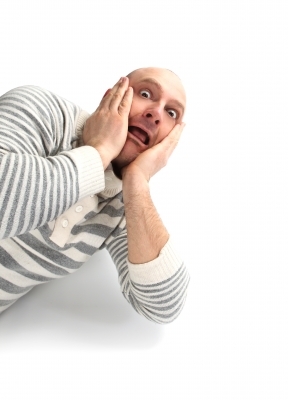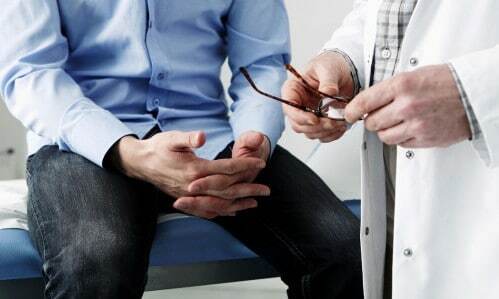One of the most common diseases of the male genitourinary sphere is chronic prostatitis. As medical practice shows, this disease affects every twelfth male of pubertal age, and approximately 40% of cases it is diagnosed in patients 20-40 years old. Bringing his possessor physical suffering, chronic prostatitis often causes the deterioration of the general condition of the patient, preventing his normal sexual and social activity. What is the nature of this disease, how to avoid an unpleasant diagnosis - and how favorable are the predictions of treatment if you are among the sick?

Causes of chronic prostatitis
Chronic prostatitis is a prolonged inflammatory process in the prostate gland, accompanied by painful and uncomfortable sensations in the pelvic region, urinary disorders and pathologies of the male sexual function.

Prerequisites for the onset of chronic prostatitis may be infections, congestion in the prostate, benign hyperplasia, or a combination of these factors. There are several possible ways of penetrating the infection into the prostate:
- with blood flow from the foci of infection present in the body( pneumonia, caries, pustular skin lesions, sinusitis, etc.);
- with inflow of lymph from other organs( with dysbacteriosis, hemorrhoids, inflammatory bowel diseases, etc.);
- through the urethra, sexually( one of the consequences of infectious urethritis)
Non-infectious, or abacterial, prostatitis is diagnosed 8 times more often bacterial;at the heart of its occurrence are stagnant processes and circulatory disorders in the prostate and adjacent organs.
Among the main causes of stagnation in the prostate gland, urologists identify the following:
- irregular sexual life, prolonged abstinence;
- inferior ejaculation, the practice of interrupted sexual intercourse;
- often unrealized sexual arousal;
The risk of chronic prostatitis increases in men with reduced physical activity, with strong or minor, but regular, hypothermia, prolonged stays in stress, and those who suffer from alcoholism.
The main symptoms of the disease
Chronic prostatitis occurs as a result of the lack of timely treatment, or ineffective treatment of acute prostatitis, and is a slow-flowing inflammatory process in the prostate gland.
In most cases, the leak is asymptomatic, the disease is usually detected in patients only during a medical examination, which is why every man is recommended to visit a specialist on a regular basis for the presence of urological diseases. However, the so-called "hidden" stage of chronic prostatitis can change to the acute phase after a man's stress, inflammatory disease, as a result of hypothermia, violation of the order of intimate life, etc. In this case, the signal for an urgent visit to the doctor should serve as such symptoms:
- increased sweating, especially manifested in the perineal zone;
- itching or discomfort in the groin;
- frequent urge to urinate, soreness with urination, urinary retention;
- secretion of the secretion of the prostate through the external aperture of the urethra after urination or defecation;
- slight increase( up to 37.5) body temperature;weakness, sleep and performance disorders;
- disorders of sexual function( unstable or weak erection, decreased libido, rapid ejaculation, violations of orgasm, pain in the pelvic region with ejaculation, etc.);
- pain of varying severity and intensity in the perineum, lumbosacral region, external genitals
In aggregate, these symptoms of chronic prostatitis can lead to disorders of the nervous system characterized by neurotic states with a focus on the patient's health.
Possible consequences of chronic prostatitis in the absence of its treatment
Unlike acute, chronic prostatitis is characterized by a change in wavy, periodic exacerbation of relatively long remissions, during which a man can feel completely healthy. It is not the treatment of a patient to a specialist that causes the further development of the inflammatory process.
In case of spread of inflammation through the genitourinary system, complications in the form of cystitis or pyelonephritis are possible, with possible transformation into urolithiasis. But most often the result of neglected chronic prostatitis is vesiculitis( inflammatory disease of seminal vesicles) or epididymoorkhit( inflammation of the testicles).Both of these diseases can lead to intractable infertility, and sometimes - and irreversible violation of male reproductive function.
One of the hardest outcomes of chronic prostatitis is scarring of prostate tissue with wrinkling of the organ. This process often extends to the back of the urethra and bladder, which leads to a persistent violation of urinary outflow.
The combination of the disease with prostate adenoma, most common in men over 50 years old, significantly aggravates the situation. Violating the outflow from the prostate gland, adenoma provokes the progression of chronic prostatitis, so if the patient is shown prompt removal of a benign tumor, it must necessarily be preceded by treatment of prostatitis.
Diagnosis, methods and prospects for the treatment of
The primary procedure for a physician is to collect information about the main symptoms of the disease, followed by a general examination, a digital rectal examination, and taking the patient's secretion of the prostate gland. Another diagnostic measure for the diagnosis is a transrectal ultrasound examination.
Before starting a course of therapy for a patient with chronic prostatitis, it is necessary to make a urine test for culture and to conduct a prostate secretion study on the flora sensitivity to antibacterial drugs, in order to optimize the treatment technique.
Modern medicine uses the following, traditionally used in the complex, methods of treatment of chronic prostatitis:
- Antibiotic therapy. Use of antibacterial drugs is necessary to eliminate the pathogenic bacterial flora that causes foci of inflammation. From the correct selection of drugs directly depends on the effectiveness of treatment, because if in the course of therapy not all microorganisms are destroyed, the disease sooner or later will again manifest itself. For this reason, the course of antibiotics should be passed completely to the patient, without interruptions in admission or other violations of medical recommendations.
- Physiotherapy. Massage of the prostate gland is in the complex of such procedures one of the most effective components of treatment. The essence of the massage of the prostate is as follows: the effect on the gland facilitates the squeezing of the inflammatory secretion accumulated in it into the ducts and further into the urethra. This improves the quality of blood flow in the prostate, which enhances the effect of the patient's antibacterial drugs. In addition to prostate massage, a patient with a diagnosis of "chronic prostatitis" can be prescribed laser treatment, ultrasonic waves or by electromagnetic influence on the inflamed area.
- Immunocorrection. A prolonged inflammatory process, such as chronic prostatitis, as well as an independent or misdiagnosed antibiotics in the past may contribute to a significant decrease in immunity of the patient. The goal of immunocorrection is to restore the protective functions of the body as much as possible. This is facilitated by the normalization of the way of life and visits to the immunologist.
Although not every case of chronic prostatitis, due to various forms of its complexity, can result in a complete recovery of the patient, strict adherence to the patient's medical recommendations guarantees him a prolonged, and perhaps lifelong, remission of the disease.
How to avoid an unpleasant diagnosis?
Prophylaxis of chronic prostatitis consists in the observance of several basic rules: 
- Change your lifestyle to a more active one. If there is no possibility to go in for sports, do daily warm-up or gymnastic exercises.
- Avoid overcooling. Do not sit on stone slabs, metal curbs, etc.
- If constipation, use laxatives, and if constipation acquires a chronic form - visit a doctor.
- Try to normalize your sex life. Excessive sexual activity, as well as long abstinence, negatively affects the status and functions of the prostate gland.
- Do not practice casual sex, otherwise - give preference to protected sex.
- If you suspect a STD immediately, consult a specialist immediately, do not self-medicate.
- Visit the urologist at least once a year to exclude the possibility of developing a disease.
Be attentive to your male health, and the diagnosis of "chronic prostatitis" will never get in your way!



